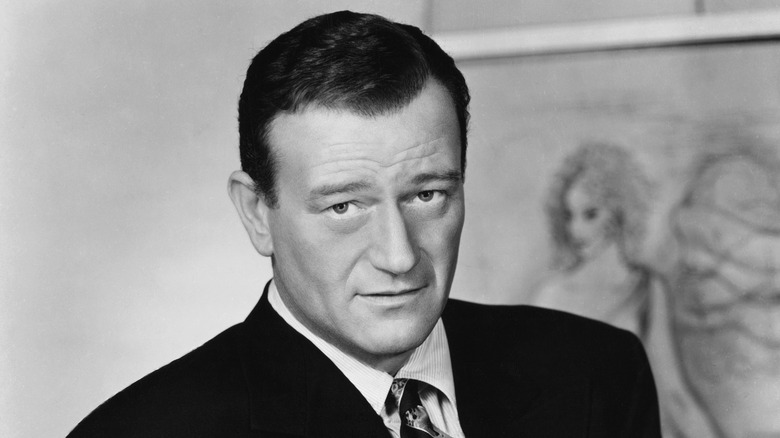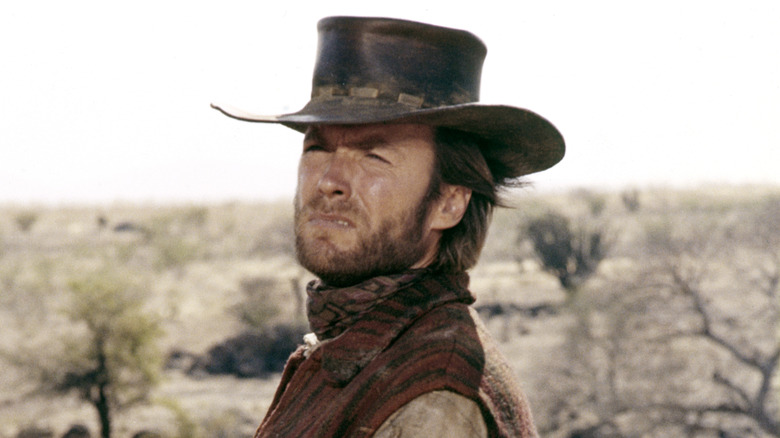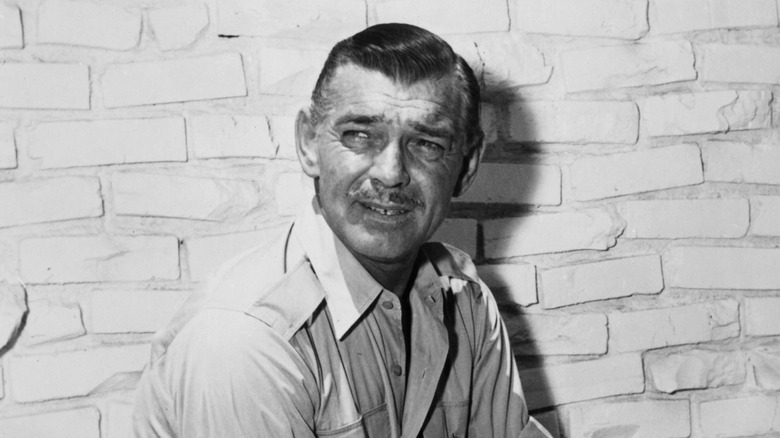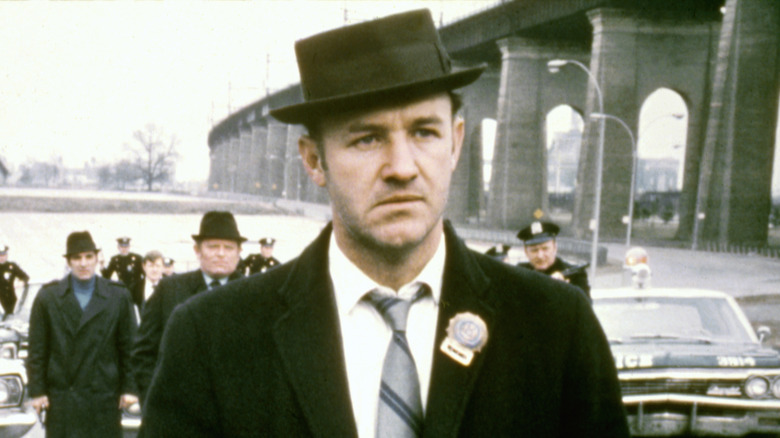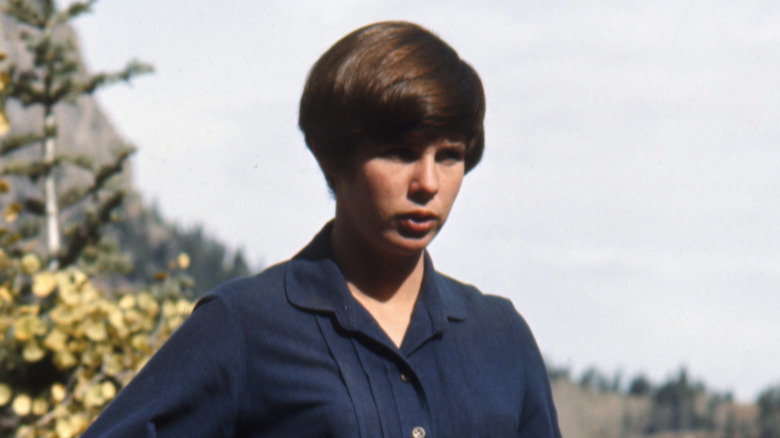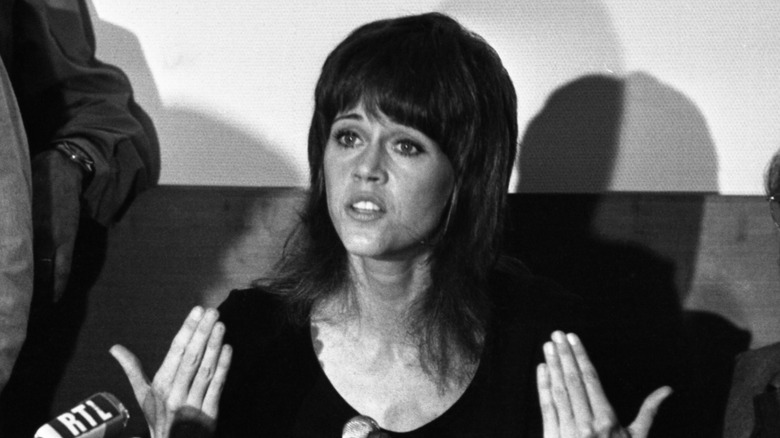Stars That John Wayne Couldn't Stand
John Wayne is one of American cinema's most indelible stars, however he is also one of its most infamous. Despite a heyday of Western classics that made him a darling with audiences, from "Stagecoach" to "The Searchers," he garnered a reputation for being unapproachable, stubborn, and difficult to work with on set. Beyond that, his stark, right-wing politics often clashed with many of his co-stars, and a now often-cited 1971 interview with Playboy had him defending white colonization and decrying Indigenous "selfishness." Since then, a reappraisal of history has deemed Wayne a nationalistic, racist curmudgeon who Hollywood has now outgrown.
The truth is that John Wayne, born Marion Robert Morrison and nicknamed "The Duke," had many tumultuous relationships with other actors throughout his career. Some made for his most lasting friendships, such as with "Searchers" co-star Ward Bond. Others, like with crooner-turned-actor Frank Sinatra, would only be resolved after publicized feuding. However, some were never resolved. In fact, some were just plain bizarre, seemingly inspired by the stubborn self-righteousness that gave him his infamy in the first place. Here are five key examples, and they may not be the ones you expect.
Clint Eastwood
You would think two icons of the American Western would naturally get along. However, Wayne never quite took a liking to Clint Eastwood, nor the morally dubious spaghetti Westerns that made him a star. Wayne had made a career off of playing valiant heroes; even the washed-up characters in his later films had codes of honor. Eastwood, on the other hand, often portrayed staunch antiheroes, driven by their own selfish, violent means, with little care for law and order.
Wayne and Eastwood's careers often intersected, however Wayne was always trailing behind. He turned down the lead role in "Dirty Harry," leaving Eastwood the chance to scoop it up and become a doubly-successful movie star. When he attempted to replicate its success with his own cop actioner, "McQ," the film performed poorly at the box office and made it clear Wayne couldn't pull off Eastwood's natural murkiness.
Things came to a head when Eastwood sent Wayne the script for "High Plains Drifter." Both parties were interested in working together, however, according to film historian Mary Lea Bandy's book "Ride, Boldly Ride: The Evolution of the American Western," Wayne sent Eastwood a letter claiming his script "did not represent the true spirit of the American pioneer, the spirit that had made America great." Eastwood didn't balk. "I realized that there's two different generations, and he [didn't] understand what I was doing." As Eastwood continued rising to genre glory, Wayne's career slowly went on the decline.
Clark Gable
John Wayne and Clark Gable never shared the screen together, yet some pretty nasty comments have since gone on the record about how much he detested the debonair leading man. In her memoir, "John Wayne: My Father," Wayne's daughter, Aissa, recalls his disdain for Gable: "[He's] extremely handsome in person ... But [he's] an idiot. You know why [he's] an actor? It's the only thing he's smart enough to do." That's some harsh criticism coming from someone who began his career as a prop man.
Aissa theorizes John's frustration with Gable came from his on-set feuding with frequent collaborator John Ford on the set of 1953's "Mogambo." Ford's abrasive, cut-and-dry style was often too much for Gable, who at one point stormed off set out of anger. Though the film was completed successfully and became a box office smash, their relationship remained rocky in the years following the shoot. John, with whom Ford had established a strong camaraderie after several projects together, knew which side he was on. Aissa writes, "In my father's way of thinking, disloyalty to allies ... was expressly forbidden. If Clark Gable took on John Ford, my father's code demanded that John Wayne stand by his old pal."
Gene Hackman
Out of every controversial thing John Wayne has said about a fellow actor, this might just be the strangest and most random callout. Like Gable, Wayne had never worked with Gene Hackman, the legendary character actor known for films like "The French Connection" and "The Conversation." During Duke's second, late-stage career peak, Hackman had just burst onto the scene with "Bonnie & Clyde," a film that earned him an Academy Award nomination for Best Supporting Actor. He earned widespread acclaim for his performance, but it appears that Wayne was never impressed.
In yet another insight derived from his daughter's memoir, Aissa writes that "Jackman could never appear on-screen without my father skewering his performance ... my father called Hackman 'the worst actor in town. He's awful.'" The most confusing part? Aissa isn't even sure why. There is no record of Wayne ever meeting Hackman in the first place.
This is especially tragic because the hate doesn't go both ways. In an interview with the Fort Worth Star-Telegram promoting his work in the Clint Eastwood Western "Unforgiven," Hackman said of Wayne that he "was one of the best actors ever ... I could never be the man he was, because his politics and mine would be incompatible, but you must admire how really good he was as an actor, in command of the scene and with such great charisma." It's unclear if Hackman ever heard Wayne's disparaging comments, but better to not risk Hackman speaking ill of the dead.
Kim Darby
Though reports vary about John Wayne's on-set behavior, nobody can deny that he had high standards for professionalism – even when he grew ill-tempered when they weren't met. If Wayne didn't reprimand you in front of the cameras, he just as easily could have badmouthed you behind them. This was the case for Kim Darby, Wayne's co-star in the 1969 adaptation of "True Grit." Darby was Mattie Ross to Wayne's Rooster Cogburn, a relationship that lent itself to contention.
Things began on the wrong foot before Wayne even stepped onto set. According to Michael Munn's biography, "John Wayne: The Man Behind The Myth," Wayne had originally promised the role of Mattie to his daughter, Aissa. However, director Henry Hathaway had already cast Darby in the part, forcing Wayne to take back his promise and leaving his daughter shattered. Things were made worse when Darby and Wayne started working together. "[Darby] was strong-willed, independent, and determined," Wayne is quoted saying. "That's great for the character, but not so great for an actor."
Despite Wayne's best efforts, Darby was aloof toward him throughout the shoot, likely due to her marital difficulties at the time and being forced to care for her newborn child while on set. To Wayne, this made her come off as self-righteous, spoiled, and unprofessional. "I like me and my screen partners to get along. Jesus, I got along better with Kirk Douglas!"
Jane Fonda
John Wayne's conservative politics made him a rousing patriot, especially during wartime. When World War II came around, he wished to serve alongside many other leading actors of the time. However, his family at home (a wife and four children) and aging physical condition kept him from enlisting despite adamant efforts. Wayne, instead, found other ways to contribute to the war effort, including on the big screen. During the Vietnam War, Wayne staunchly supported the United States' fight against communism, having previously supported Joe McCarthy and his Un-American Activities Committee.
Jane Fonda grew up watching her father, Henry Fonda, oppose Wayne's view of communism and would grow up to staunchly oppose America's fight in Vietnam. A 1972 photoshoot with an anti-aircraft gun in Hanoi turned her into one of a celebrity icon of '70s counterculture, which outraged many conservatives, including Wayne. As quoted in Scott Eyman's biography, "John Wayne: The Life and Legend": "I would think somebody like Jane Fonda ... would be terribly ashamed and saddened that they were part of causing us to stop helping the South Vietnamese ... They're getting killed by the millions. How the hell can she and her husband sleep at night?" Since then, Fonda has continued to be outspoken in her political beliefs to the point of being arrested a handful of times, even at the age of 82.
